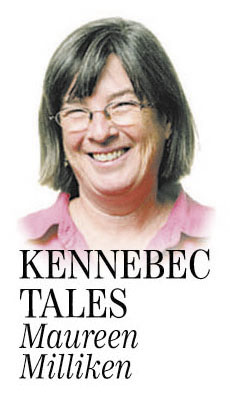As everyone knows — or should, because after all, it’s a day off for a lot of people — Monday is Patriot’s Day.
And as everyone should also know, it commemorates the “shot heard around the world.” No, old-timers, not Bobby Thomson’s ninth inning homerun that lifted the New York Giants over the Brooklyn Dodgers for the National League pennant in 1951.
This was the shot at Lexington and Concord in 1775 that gave the 13 colonies the pennant win over the British. And we all know who won that World Series.
That shot was on April 19. The holiday, celebrated in Massachusetts and Wisconsin as well, used to be on April 19, but was moved to the third Monday of April, so this year it’s April 20. In those two states, it’s Patriots’ Day, with the apostrophe indicating it’s about more than one patriot, unlike Maine. But that’s a different column for a different day.
Massachusetts, with pride of place, goes whole-hog on re-enactments on Patriots’ Day at Minuteman National Park. It also, for the past 119 years, has been the day the Boston Marathon is held. It’s hard to live in Massachusetts, at least eastern Massachusetts, and not be aware it’s Patriots’ Day.
In Wisconsin, it’s not really a holiday, but rather a public school “special observance day,” one of many that state’s legislature has established for the schools.
Lest we get too excited about Wisconsin getting on board with our New England sensibilities, keep in mind that the schools also mark Mildred Fish Harnack Day.
The state education department website says that these 21 special days are to be held on the actual day. That would be April 19 for Patriots’ Day. Since that’s a Sunday this year, the schools can take it on another day.
The Wisconsin Department of Public Instruction is pretty succinct in its description of what Patriots’ Day commemorates:
“Patriots were colonists who wanted independence from British rule. Most hoped to find peaceful ways to settle their differences with England. When the British decided to look for Samuel Adams and John Hancock, who were hiding in Concord, Paul Revere and Billy Dawes rode through the night warning other Patriots in New England. The American Revolution began when the first shots were fired at Lexington on April 19, 1775. Each side said the other fired first. Patriots’ Day was established to mark the beginning of the Revolutionary War.”
Yup. That’s it in a nutshell.
Though in New England the way we learned it was a lot more fun and stirring: We memorized Longfellow’s “Paul Revere’s Ride,” which made up for in drama what it may have lost in historical accuracy. Poor Bill Dawes, going down in history as the guy who got left out, except in Wisconsin.
Isn’t this better than Wisconsin’s dry telling?
You know the rest. In the books you have read
How the British Regulars fired and fled,
How the farmers gave them ball for ball,
From behind each fence and farmyard wall,
Chasing the redcoats down the lane,
Then crossing the fields to emerge again
Under the trees at the turn of the road,
And only pausing to fire and load.
Maine gave the world Henry Wadsworth Longfellow, and he ought to be included in any Patriot’s Day festivities.
Portland holds a Patriot’s Day 5-mile race, sponsored by the Boys & Girls Club and held on the real day this year, April 19. The race doesn’t go by Longfellow’s house on Congress Street, but in its 86th year, it IS the oldest road race in Maine, according to all sources. So even if it doesn’t touch on the real meaning of Patriot’s Day, it taps into New England’s need for history and tradition. Up until 2009, it was run on the Monday holiday competing for spectator interest with the televised Boston Marathon. Now it is run on the Sunday of Patriot’s Day weekend (except last year, when that Sunday was Easter).
Ogunquit has a weekend-long celebration that probably has to do more with spring arriving and it being a long holiday weekend and seasonal businesses opening for tourist season than us throwing off the shackles of the crown.
So despite living in the cradle of the Revolutionary War, we don’t spend much time “through all our history, to the last” wakening and listening to hear, as Longfellow predicted, “The hurrying hoof-beats of that steed and the midnight message of Paul Revere.”
For you non-English majors, the message Longfellow predicted we’d remember wasn’t so much “The British are coming!” as the defiance and independence that gave birth to this unique and wonderful nation.
Nowadays, our biggest concern about the British crown is predicting when Kate is going to have her baby, and we get most of our news about our former rulers from People and Us magazines.
We forget, 240 years later, that we were not going to bow to a crown, but wanted equal representation, among a lot of other things. That belief ended up becoming the American dream: Supposedly anyone in this country can be anything he or she aspires to. There are obviously flaws, but as we continue to fawn over the world’s richest welfare recipients (yes, the British royal family), it’s worth remembering why we don’t have that here.
Want to celebrate Patriot’s Day? Let’s put down the People magazine — that one that features all Kate’s maternity outfits leading up to the impending birth of the next little prince or princess — and recite some Longfellow.
Maureen Milliken is news editor of the Kennebec Journal and Morning Sentinel. Email her at mmilliken@centralmaine.com. Twitter: mmilliken47. Kennebec Tales is published the first and third Thursday of the month.
Send questions/comments to the editors.


